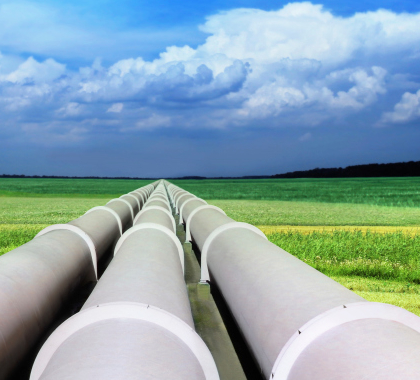Activists are proposing Michigan voters break an agreement that currently allows a company to ship crude oil through a pipeline under the Straits of Mackinac, located at the north end of the state.
A ballot proposal sponsored by the group Keep Our Lakes Great would ban oil from being transported through a 645-mile pipeline owned by Enbridge Energy. Four miles of the pipeline run under the Straits of Mackinac, the waterway separating Michigan’s Upper and Lower Peninsulas at the juncture of Lake Michigan and Lake Huron.
Michigan’s Board of Canvassers approved the proposal’s language on April 26, which allowed its supporters to begin gathering signatures on May 1.
The pipeline in question, Line 5, has carried light crude oil, light synthetic crude oil, and natural gas liquids under the straits for 64 years. Approximately 540,000 barrels of oil, or 22.7 million gallons per day, are transported through Line 5 from Michigan’s Upper Peninsula to southeast Michigan and Ohio.
Even though an agreement is already in place between Enbridge and the State of Michigan barring heavy crude oil from being shipped through the pipeline, concerns over the safety of Line 5 grew following a crude-oil spill at another Enbridge line in 2010, contaminating Talmadge Creek and the Kalamazoo River in southwest Michigan.
The ballot proposal would not shut the pipeline down entirely. Line 5 could still carry propane and natural-gas liquids.
Pipeline Safety Questioned, Studied
Ryan Duffy, a spokesman for Enbridge, says Line 5 has been virtually spill-free for the past 15 years.
“Over the past 15 years, there have been three incidents on Line 5 that have resulted in a total of approximately 21 barrels of product being released off the mainline,” said Duffy in an e-mail to Michigan Live. “All of the product released during these three incidents was recovered. There has never been an incident on Line 5 at the Straits.”
In addition, Duffy says research is currently being conducted concerning the safety of Line 5, and any decisions about the pipeline’s operations should be delayed until the research is complete.
“Our focus is on the safe operation of Line 5,” said Duffy in a press statement. “And to demonstrate beyond a doubt to people in Michigan that Line 5 is operated safely and is in very good condition, Enbridge is initiating several large safety projects this summer.
“It is important to allow the process to work, and to wait for the findings of the two independent studies of Line 5 now underway,” Duffy’s statement said.
Pipeline, Rail, or Road?
Jason Hayes, director of environmental policy at the Mackinac Center for Public Policy, says a pipeline ban means the light crude oil the pipeline currently carries would have to be transported by rail or roadway, which are far more likely to result in spills.
“A Manhattan Institute study showed rail transportation has double the number of incidents and spills than pipelines,” said Hayes. “And that doesn’t factor in the potential for interrupted service and supplies during extreme weather.”
The Association of Oil Pipe Lines says 99.999 percent of all petroleum products transferred through pipelines arrive safely. There are 2.6 million miles of pipelines in the United States, more than 9,700 miles in Michigan.
Offers Other Options
Given the importance of Line 5 to consumers and the state’s economy, with Enbridge having paid more than $22 million in taxes in 2014, critics should consider alternatives other than a ban, Hayes says.
“The best option for addressing the ‘shut it down’ concerns would be to begin seeking the possibility of constructing an updated replacement for Line 5, examining the costs and benefits of doing so,” Hayes said. “What options for locations would there be, especially given the current resistance to the construction of new pipelines?
“Could a new pipeline be built, even with current technologies, to the extreme safety standards demanded by environmental groups, and be permitted and placed in the same location?” Hayes said. “Is there any pipeline, in any location, these groups would approve of?”
Keep Our Lakes Great will have to collect at least 252,523 valid signatures of Michigan voters in a 180-day period beginning May 1 for the proposal to be considered. If enough signatures are gathered, the measure will go to the Michigan Legislature for consideration. Lawmakers can approve the measure, propose their own alternative, or reject it, which would automatically put it on the November 2018 ballot.
Kathy Hoekstra ([email protected]) writes from Saginaw, Michigan.





